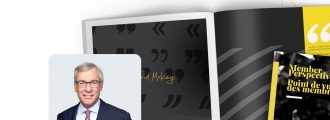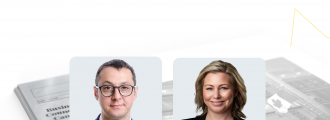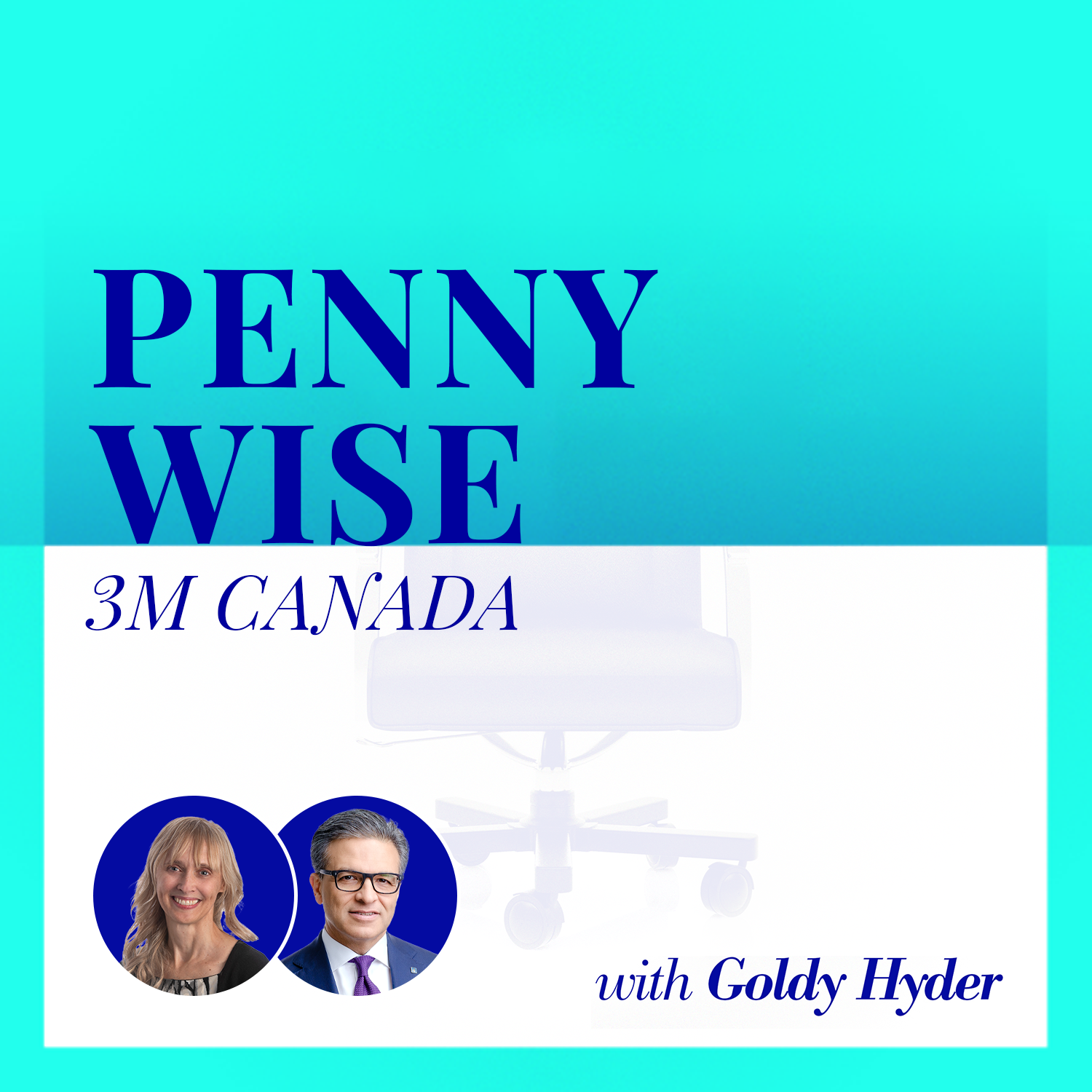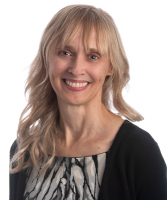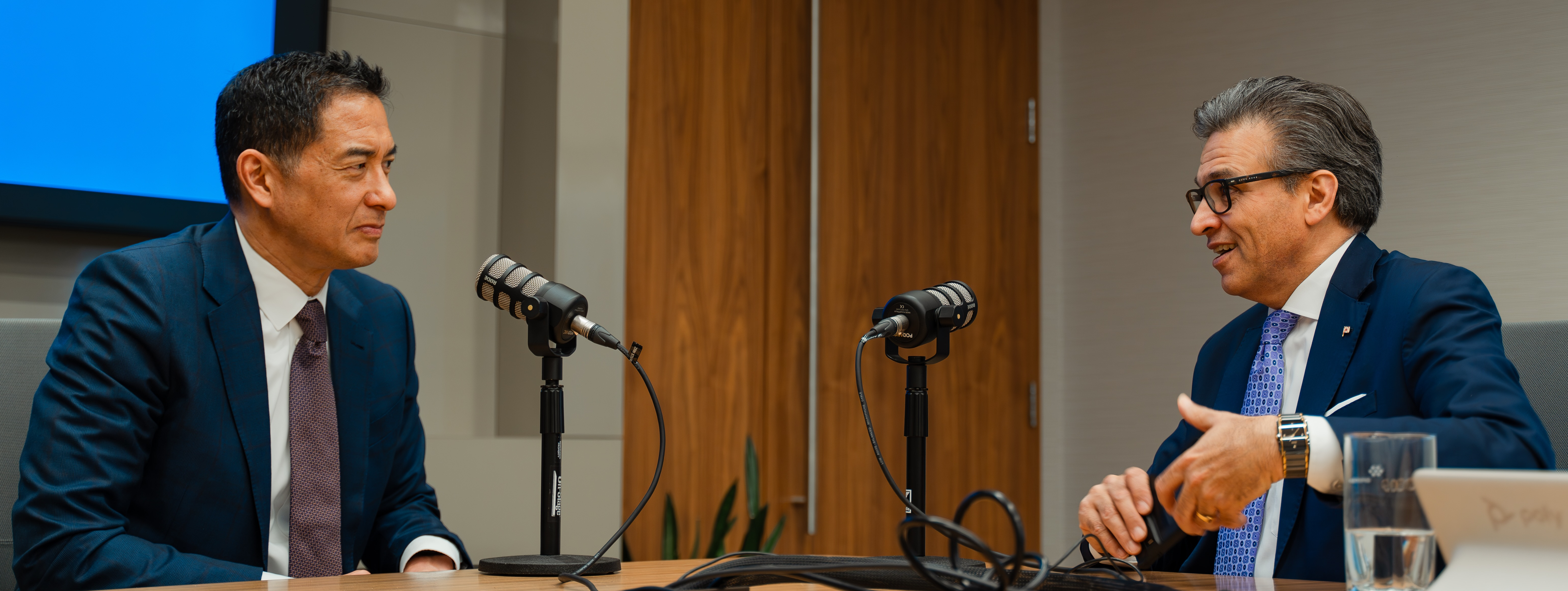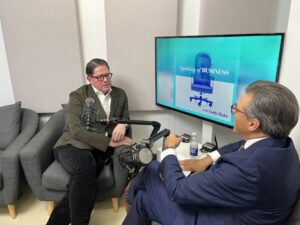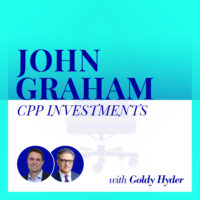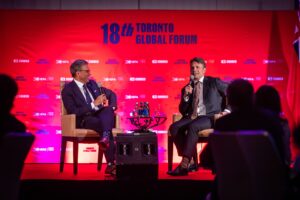COVID-19 created an “inflection moment” that offers Canadians a chance to build a better future, according to Penny Wise, President of 3M Canada. “We have a huge opportunity to make a difference and really change the growth trajectory of Canada if we really seize that moment,” she says.
In a conversation with Goldy Hyder on the Speaking of Business podcast, Wise points to three ingredients that should be part of the country’s economic recovery.
First, she urges the country to develop an industrial strategy that capitalizes on Canada’s strengths and potential.
Second, Wise emphasizes the importance of getting women fully engaged in the economy again, including in leadership positions, pointing to the large number who left the workforce during the pandemic.
Third, we need a stronger focus on teaching science, technology, engineering and math (STEM), and on ensuring under-represented groups have access to that education. “Our future lies in making sure those people who want to pursue STEM — who want a job, who want a career — that we are providing them with the opportunities to make that happen,” Wise says.
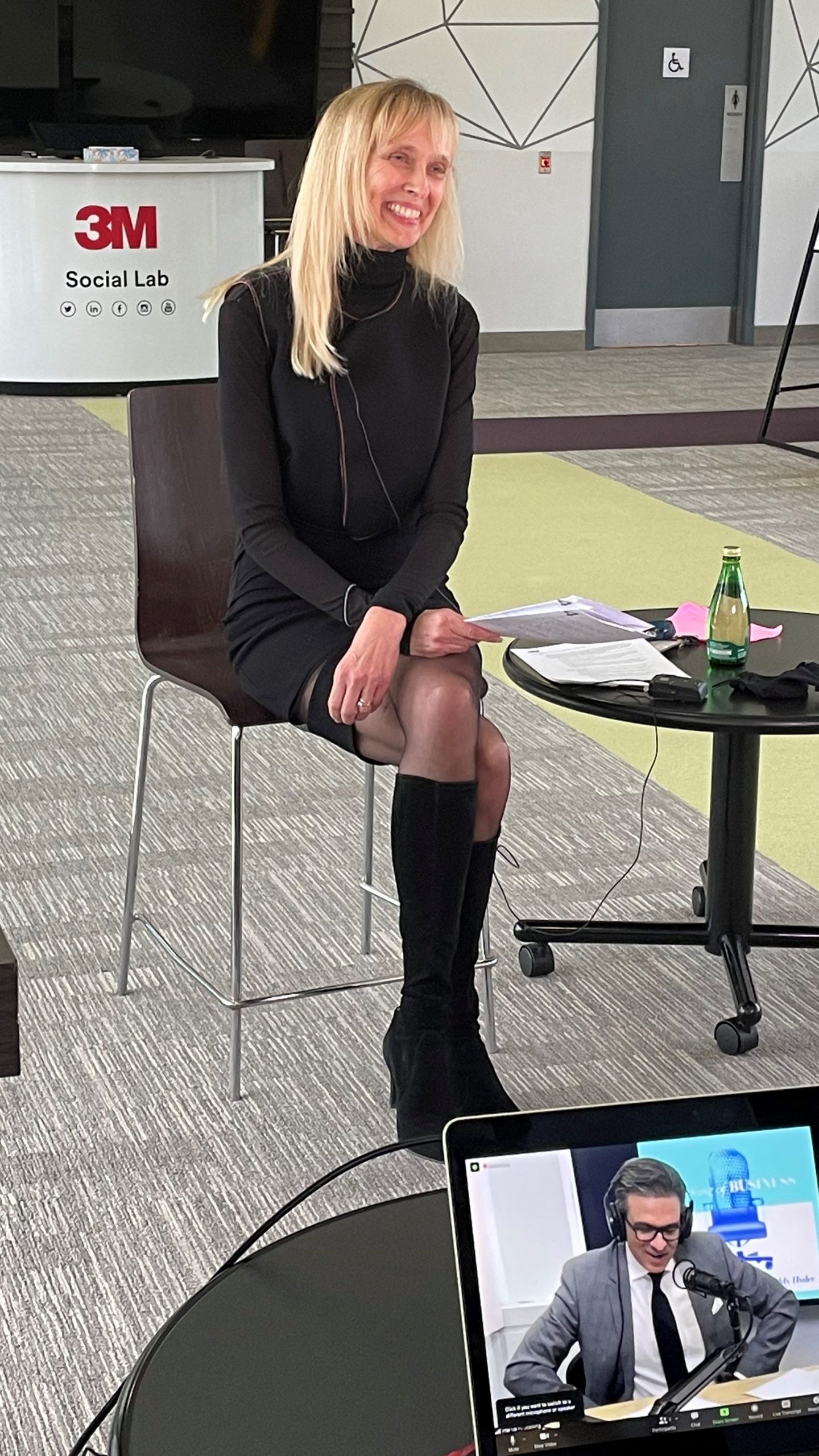
Penny Wise:
When we are focused, when Canadians collaborate, when we know what the goal is, when we know what we need to get done, we can all come together and we can make it happen and we can make it happen really quickly.
Goldy Hyder:
Welcome to Speaking of Business, conversations with Canadian innovators, entrepreneurs, and business leaders.
Goldy Hyder:
I’m Goldy Hyder, President and CEO of the Business Council of Canada. I’ve said it many times but it bears repeating, business leaders are problem solvers. Just look at the past two years and the way leaders acted quickly to address the many issues arising from the COVID-19 pandemic. Penny Wise is one of those leaders. She is president of 3M Canada, and she faced a unique problem. You see, 3M manufactures those essential N-95 face masks, the ones healthcare workers rely on. But in the early days of the pandemic, none of those masks were produced here in Canada. So Penny Wise got to work. By collaborating with the federal and provincial governments, 3M started expanding its plant in Brockville, Ontario, with the aim of making N-95 masks. Today, Brockville is supplying those coveted masks to healthcare workers across Canada.
Goldy Hyder:
What lessons in leadership did Penny learn along the way? Let’s find out. Welcome back, Penny. Great to have you.
Penny Wise:
Thanks for the invitation back, Goldy. Great to see you again.
Goldy Hyder:
Well, look, last time we spoke, you were relatively new into the job. You had an international role with 3M and you were appointed, you’re Canadian, you’re appointed the CEO of 3M in Canada and a pandemic is going on. And of course, one of the big things in the pandemic was these masks, these N-95 masks. And so as I just said in the introduction, you were able to get the funding necessary and the cooperation necessary. Tell us a little bit about how you went about doing that.
Penny Wise:
So first of all, Goldy, it’s really great to be back. Hard to believe it’s two years since we talked and how much crazy has happened in the last two years. And when you first talked to me and asked me questions about N-95s and how were we going to get them to Canadians and the shortages and what was happening around the world, there were things I knew about the plans we had and the things we were thinking about doing and how we wanted to act and how we wanted to bring N-95 manufacturing to Canada. But of course at the time I couldn’t tell you and I was just, “I just want to tell you, I just want to give you a hint.” But I couldn’t give you a hint.
Penny Wise:
So here we are two years later and we have an N-95 manufacturing facility in Brockville that we built in seven months, which is I think the fastest that 3M has constructed an N-95 facility around the world because we were able to leverage the technology and expertise of 3Mers around the world, as well as the partnership and collaboration that we had with the federal and Ontario governments to make it happen. We’ve been manufacturing N-95 respirators for over a year now and continue to run the plant 24/7.
Penny Wise:
Interestingly, you talked about masks and respirators and you talked about mask mandates, and obviously across the country now mask mandates are dropping. But there’s a difference between a respirator and the masks that we wear every day. An N-95 respirator is a really important component of somebody’s personal protective equipment and protects our healthcare workers, protects our long-term care facility workers, protects critical infrastructure workers and industrial workers.
Penny Wise:
And so the N-95 facility that we have in Brockville continues to manufacture to make sure that we can still provide that critical personal protective equipment to individuals who need it across the country. And during the pandemic, as we started to manufacture, we were incredibly proud to be able to support those individuals because during those shortages, we were seeing people reusing respirators. We were seeing counterfeit respirators. We were seeing shortages where people who needed it to protect themselves every day were not being protected. I’m very proud of our work, our teams, our employees, and what we brought to life through the N-95 facility.
Goldy Hyder:
Well, sure glad you moved as quick as you did. You mentioned the collaboration with the federal and the provincial governments. Tell me a little bit about that because that partnership is such a critical component of how Canada responded to the pandemic.
Penny Wise:
The N-95 respirators that we produce, the way I describe it is they are the gold standard of respirators and healthcare workers were asking for those respirators. And it really was, you could see all across Canada, across the government, federal government, the provincial governments reaching out to make sure that they could find the protective equipment across all functions, not just respirators, but all PPE to make sure our healthcare workers were properly protected. And you could see many partnerships that were created.
Penny Wise:
It was a really strong, well organized partnership. We were really proud to work with them and work with the procurement organization. And you could see when we are focused, when Canadians collaborate, when we know what the goal is, when we know what we need to get done, we can all come together and we can make it happen and we can make it happen really quickly.
Goldy Hyder:
I love it. Canadians working together can get stuff done.
Penny Wise:
We absolutely can.
Goldy Hyder:
Let’s pull out a little bit if we can because you’re obviously a successful woman CEO and a leader in her own right. It’s been said that the pandemic has really punished women in particular, that it’s been tough on women. Tell me how you managed it and how your colleagues who are women managed it.
Penny Wise:
You are absolutely right. And I don’t think anybody needs to, we don’t need to repeat all of the statistics that are out there, but it was very clear that during the pandemic women left the work force in greater numbers than men did and for many reasons. Women were in industries and sectors of the economy that were hardest hit by the pandemic: hospitality, restaurants, service industries.
Penny Wise:
And then women had to make really difficult choices about taking care of families. Who was going to look after children? Who was going to look after elderly parents? Who was going to take care of people in long term care facilities? And so a lot of women chose to leave the workforce. What it means for Canada is for an economic recovery for the future, 50% of the workforce is women so we need women to come back to work.
Penny Wise:
I was very fortunate during the pandemic, have a great support system. My children are grown up mostly so that many of the decisions that were facing women across Canada, across the world was not something that I had to face directly. And so it was an opportunity for me to help support those in our organization and make sure our company was doing the very best we could to support the women and parents and others in our organization who needed it. And so we did it through things like flexible work arrangement, working from home, really focused on wellbeing and mental health of our organization and providing the supports that we needed to make sure people could continue to do their job and work through the hours they needed to work through and that there was support and activity behind them.
Goldy Hyder:
You mentioned the flexibility that you’ve introduced. How is that going in terms of bringing about some kind of a predictability for people to be able to come to work or have some kind of a flexible or a hybrid environment? Everybody seems to be having their own experiment. What’s the 3M experiment with this?
Penny Wise:
I’m really excited about the 3M experience that’s taking place and how we’re transforming our culture to be more flexible and we’re embracing what we call “Work Your Way.” And the way that 3M has rolled this out around the world is that each of us has a conversation with our leader and our supervisor and talks about how we want to work. So as an individual, as an employee, I trust you here. You are going to work the way that you need to work. So we are giving people the opportunity to decide will I work fully remote? Will I work hybrid and come into the office one, two, three days a week? Or will I be in the office full time? And we’re providing that flexibility and not just picking once and locking down, but over time as your needs, as your job evolves, as what you need to accomplish evolves, as your family grows, as your situation changes, we will continue to offer that flexibility.
Penny Wise:
One of the silver linings of the pandemic for us at 3M was we moved to a new global model in how we did business and how we worked. And what we found was we had new teams and we have a new area called US and Canada or USAC. And we have USAC teams. And during the pandemic, everybody worked virtually, everybody worked online, everybody was on Teams calls together. And so what that’s created is a culture of, we can work across borders. You can do a job from anywhere in the world for 3M. For me, when I took on a global job, I moved to the U.S. I moved to the head office in the Twin Cities in Minnesota. People today have more flexibility than that. We can still do those jobs from Canada. I’m really excited about the opportunities for Canadians and the opportunities they have for regional area and global roles moving forward and the flexibility that’s been provided through the organization.
Goldy Hyder:
So obviously that’s key to getting women back for sure. That’s one thing.
Penny Wise:
Absolutely.
Goldy Hyder:
But it must also be one of the vehicles by which to address the thing that I hear a lot from our CEOs across the country, which is just how tight of a labour market that it is. How are you finding the talent now?
Penny Wise:
When I think about talent, before I comment on that, one of the pieces that is really important in coming out of the pandemic is a Canadian industrial strategy. And you and I have talked about this before Goldy. In fact, you are probably the one that inspired me with the comment when you said “In Canada, we can make whatever we want. It’s just Canadians aren’t going to want to pay $5,000 for an iPad.” And so I really step back and I think that we need to reflect on what the Canadian industrial strategy needs to be. What do we need to manufacture here in order to be self-sufficient? And then how do we balance that with the fact that no country in the world has more free trade agreements with other countries than we do. There is a balance for that policy for the future. And I think that really speaks to the challenge of labour and the challenge of getting talent, and that we need to understand what that strategy is and what we’re going to do so we know what kind of talent we’re looking for, and we can attract that talent.
Penny Wise:
From a 3M perspective, or when I think about talent, it is definitely a tight talent market and there are lots of opportunities out there for employees, but I think we have a really strong culture that both attracts talent and helps us retain talent. And that culture comes through in big and small ways, whether it’s a really strong culture of ethics and compliance and always doing the right thing, whether it’s Work Your Way that we just talked about in creating that flexible environment, or the career opportunities that exist inside a company like 3M. I talk to people who’ve worked for 3M for 25, 30 years, and they’ve had four or five different careers because of the opportunities that exist, the training, the collaboration, the innovation, all of those have created a really strong culture that attracts talent and retains talent.
Goldy Hyder:
You and I have talked before about our love for Canada, and sometimes the frustrations we have with it. You’re Canadian, as I mentioned, you had an opportunity to do a global role. You mentioned it was out of the United States and you had a chance to kind of look at Canada from the outside in and now you’re back. Have we changed much in the last little while?
Penny Wise:
That is a super interesting question to parse out. I think that there are parts and heart of Canada that haven’t changed. When I think about what makes Canada special, why I’m proud to be Canadian, why I’m proud to show my passport when I traveled around the world was this community and this focus on doing the right thing and coming together. We talked a little bit about it at the beginning of the pandemic, we all came together. We knew there was a problem, we pulled together, we all did the right things, and we knew we needed to take care of each other and support each other and be kind and take care of each other across the country. And I think that’s very different than many other countries where people were very much looking out for themselves. And I think that’s part of the Canadian spirit that makes us such a wonderful place to do business, to grow, to build a company, to drive forward.
Goldy Hyder:
Is there a but?
Penny Wise:
I think that we can always be more competitive. We can always be more business focused. We can always think a little bit harder, again, coming back to industrial strategy and being really firm on how we want to drive things forward. There’s always opportunity for us to do that better and be more competitive in that regard.
Goldy Hyder:
Yeah, I think ambition, we’ve seen that when we are ambitious, we can achieve so. And I’m sure that’s important for companies like yours who have global headquarters elsewhere who have to compete with your counterparts around the world for capital to be allocated to Canada. What’s the pitch that you make to say, “Hey, Canada’s a great place to invest.”
Penny Wise:
One of the great lessons I learned having spent time in the U.S. and being part of the U.S. organization was becoming really familiar with what the global organization looked like and how it worked and how you pitch and who the people are and who the decision makers are. And so, as we thought about at the N-95 facility is a great example. It was me and a team here in Canada understanding what our value proposition was, what the added value was, why it would be good business, how we could make a difference, all of those pieces coming together and knowing who to talk to and how to get that done and how to make the pitch.
Penny Wise:
We have great resources. We do have good labour. We have strong education. We have strong healthcare. We have a lot of different pieces across the country that make us competitive from that perspective and it really is my job as managing director in Canada to make sure that the global teams and our global leadership know about the opportunities in Canada. And I think all of us who are multinational companies, when we are the leaders in Canada, that is a big part of our job to make sure all of those benefits of doing business in Canada are clearly articulated and shared with our global counterparts.
Goldy Hyder:
And of course a big part of that, and you’ve talked about it a lot, is who we are as people. And one of the things that 3M has done is launched an initiative to encourage people from underrepresented groups to get involved in so-called STEM disciplines. Tell me about that effort.
Penny Wise:
We talked a little bit about talent and finding talent, and I think this STEM initiative is a really important part of building talent for the future. Every year, 3M globally does a study called the State of Science Index, and they do it in about 15 countries. And we talk to the general population and we ask them questions about science and what do they think about science. And last year, one of the nuggets that came out specific to Canada was 68% of Canadians believe that underrepresented communities in Canada do not have the proper access to STEM education and hence STEM opportunities in STEM jobs. And we wanted to understand why because my initial reaction is, “Oh, we should just give more scholarships.” But what we did was we called together advocates and experts from across the country, from academia, from business, from experience and we talked to them about what are those barriers? What are stopping more underrepresented groups from pursuing STEM?
Penny Wise:
And had some really amazing, eye opening conversations and we learned kind of three key things from them. The first thing we learned was we needed to change the way that STEM is taught. One of our STEM experts told us that, well, he is blind and he said, “I don’t know what a deck of cards looks like. When I was in a statistics class and they were talking about probability and shuffling a deck of cards, I had no idea what that reference point was.” Or our Indigenous leaders talked about how it’s a very Eurocentric view that we have around science. How do we have a broader view to what science and how science is and how science should be taught? That was the first one.
Penny Wise:
The second one was around moving from being just a role model to being a champion. And all of us have had champions in our lives who have lifted us up, who have given us opportunities, who have believed in us when maybe we didn’t believe in ourselves and give us the opportunities to succeed. And then the third one that they identified was it’s not just about talk, but how do we match actions to talk? We’ve kind of deep dived into each one of those elements and are really pursuing how do we move in the business community to drive those forward to get more people engaged in STEM?
Goldy Hyder:
And there must be an Indigenous component to this as well.
Penny Wise:
Yes, there is. One of our advocates and experts is from Actua. And we are really looking at how do we include, how do we create inclusion? How do we create an environment where all underrepresented populations can pursue and win?
Goldy Hyder:
I want to ask you about something because I know the answer to this, but I think it’s really important to put it out there and full disclosure, my bias is as a father of three daughters, and we were talking about women earlier. What’s the advice that you normally give young women?
Penny Wise:
I have a 24 year old daughter. And so the advice that I give her, I have a few different pieces of advice that I give her is don’t underestimate your capability. I think that women, we quite often undersell ourselves. My daughter is applying for different jobs and she’ll be like, “Oh, I don’t know if I’m qualified.” But quite often a man would apply, even if they were only 70% qualified, women have to be 95% qualified before they’ll apply for jobs. Take risks, be bold. Don’t back down. The other advice is don’t take no as an answer, that sometimes no is just not now, or I want you to position it in a different way, but think about it, come back, don’t walk away. I think it’s about being bold and taking ownership and pursuing what you want to do and making sure that you are pursuing what you really love to do in your dream and pushing through it.
Goldy Hyder:
Looking back, would Penny Wise of today say Penny Wise followed her own advice?
Penny Wise:
I think Penny Wise did follow her own advice.
Goldy Hyder:
Was it a straight line for you?
Penny Wise:
It has not been a straight line. And that is another piece of advice that I give people who join 3M is I think that all of us when we start out on our career, we are here. The straight line takes us here and that’s where we want to be. But I think that your career is a journey and sometimes there are little stops along the way that you didn’t expect to take or turns that you weren’t expecting to take that are surprises that create a much richer experience in your career.
Penny Wise:
One of my favorite examples is there were a couple of jobs when I was working in the U.S. that I did not get that I wanted. And I ended up staying in corporate marketing a little bit longer at the head office than I had originally planned. What it meant though was I was in a really great position and I led the global brand team as we repositioned the 3M brand and we launched globally a new tagline, 3M Science Applied To Life. And I watched it being launched in 70 countries simultaneously around the world. And as a marketer, there’s no better bucket list item than repositioning a Fortune 100 brand than that. I think that what didn’t seem like a good stop along the way turned into an amazing adventure and amazing opportunity.
Goldy Hyder:
They say all things happen for a reason, don’t they?
Penny Wise:
Absolutely, absolutely do.
Goldy Hyder:
Well, look, as we near the end here, I wanted to come back to the topic of Canada. I wanted to ask you, it seems like, and we’re taping this on just towards what the 20th of April here, that Canada is turning the corner. The pandemic is hopefully more behind us than it is in front of us, although we all recognize the risks that exist in other parts of the world. It seems that Canada’s on the road to recovery. What kind of a recovery do you see for us?
Penny Wise:
When I think about recovery, I come back to the industrial strategy. I think our recovery is really about focusing on what our future looks like. The pandemic has created an inflection moment for us, a reflection moment for us about what that recovery needs to look like and that industrial policy and setting ourselves up for the future. We have a huge opportunity to make a difference and really change the growth trajectory, accelerate the growth trajectory of Canada if we really seize that moment.
Penny Wise:
Recovery also to me looks like getting women fully engaged in the economy again, not just coming back to the jobs they were doing before, but getting women through into careers in high growth areas or less traditional roles, getting women through junior roles into leadership roles, getting women into senior leadership roles and into the boardrooms. To me, that’s an incredibly important part of a recovery and the growth for the future. And then of course, the STEM inequities that we talked about. Our future lies in making sure those people who want to pursue STEM, who want a job, who want a career, that we are giving people the opportunities and providing them with the opportunities to make that happen. To me, those are the key elements of what recovery should look like moving forward or help us meet that recovery.
Goldy Hyder:
They sure sound like the right things. And what’s this, best strategy is the one that plays to your strengths. And what you’ve talked about is very much our strengths. Last question that we’ve been asking everyone for this season is, do you have a big idea, some big idea that you think could really help transform Canada and her destiny?
Penny Wise:
I don’t want to sound repetitive, but I really do think it comes back to the STEM equity piece. To me, the STEM equity and getting those underrepresented communities and opening that up to Canadians is really the key to accelerated growth, to a change in the future, to a big idea that could really make a difference. And I think those of us in the business community, we have the opportunity to lead that and make that happen. We have the power to bring people in. We have the power to help transform. And that’s what I’d really like to drive forward as a big idea and get people engaged in and drive that forward.
Goldy Hyder:
Seems like a good one to me. Listen, thank you so much for doing this second time around and I hope we get a chance to complete the hat trick somewhere down the road.
Penny Wise:
Nothing like a Canadian hat trick. Thanks, Goldy.

